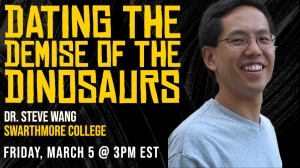Friday, March 5
3 p.m.
Virtual Zoom event
Email Kristen E. Roland or Quinn Morris in the Departmant of Mathematical Sciences for Zoom details.
Why did the dinosaurs go extinct, and when? And how do we know? Much of our knowledge of the history of life comes from the fossil record. But the fossil record is notoriously incomplete, and as a result, potentially misleading. How, then, can we learn anything about life on earth millions of years ago? In this talk, Dr. Steven Wang, Swarthmore College will discuss his research on how we can recognize mass extinctions -- such as the one that killed the dinosaurs -- from imperfect clues in the fossil record. Along the way we will explore some seemingly unrelated topics, including how the Allies estimated the strength of enemy forces during World War II.
Steve Wang is an associate professor of statistics and develops statistical techniques to address questions in paleontology and evolutionary biology. In a recent study, Wang and University of Pennsylvania paleontologist Peter Dodson showed that most of the world's dinosaurs that existed have yet to be discovered. Wang also works with paleontologists at the California Academy of Sciences and the Field Museum of Natural History, Chicago to study the causes of the end-Permian extinction, the most severe mass extinction in the history of life.
Wang has been funded by grants from the National Science Foundation, the American Chemical Society, NASA, the National Evolutionary Synthesis Center to name a few. Wang's other research areas include macroevolutionary trends and the incompleteness of the fossil record. He is also interested in statistical graphics and visualization, and statistical methods in baseball research.
Wang received his B.S. from Cornell University and his M.S. and Ph.D. from the University of Chicago.
This event is hosted by the Department of Mathematical Sciences and the Department of Geological and Environmental Sciences in the College of Arts and Sciences.
###
About the Department of Mathematical Sciences
The Department of Mathematical Sciences offers undergraduate degrees in actuarial science and mathematics, with concentrations in business, computation, life sciences, physical sciences, secondary teaching and statistics, plus a general, self-designed concentration. The department also offers the Master of Arts in mathematics, with concentrations in college teaching and secondary teaching. Learn more at https://mathsci.appstate.edu.
About the Department of Geological and Environmental Sciences
Located in Western North Carolina, Appalachian State University provides the perfect setting to study geological and environmental sciences. The Department of Geological and Environmental Sciences provides students with a solid foundation on which to prepare for graduate school or build successful careers as scientists, consultants and secondary education teachers. The department offers six degree options in geology and two degree options in environmental science. Learn more at https://earth.appstate.edu.

